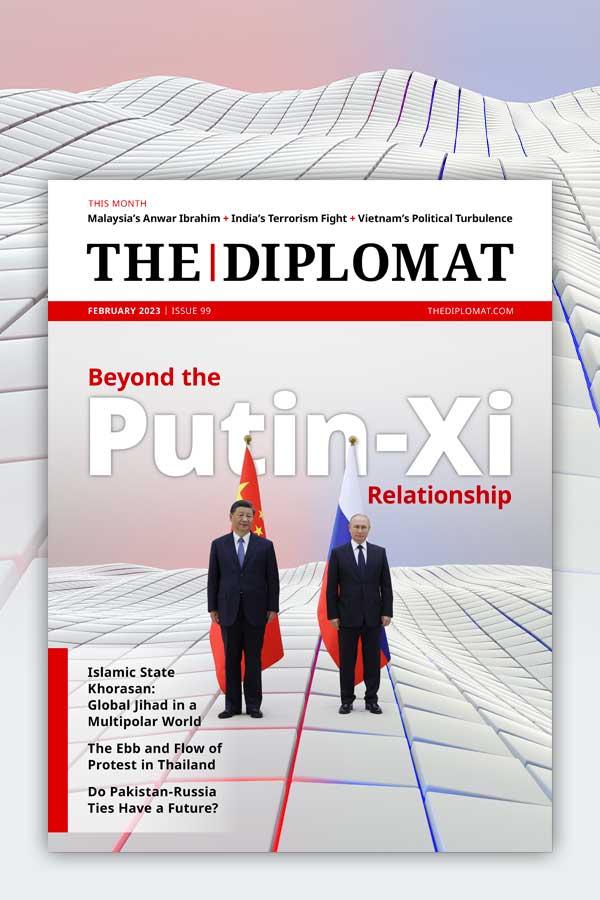| Welcome to the latest issue of Diplomat Brief. This week our top story explores the evolution of the China-Myanmar Economic Corridor two years after the military coup in Myanmar. We also have an interview with Dinesh Thakur and Prashant Reddy, authors of “The Truth Pill: The Myth of Drug Regulation in India,” about the recent spate of deaths linked to India-made cough syrup. |
| Story of the week |  | Economy The China-Myanmar Economic Corridor, 2 Years After the CoupWhat Happened: When Myanmar’s military ousted the democratically elected government of Aung San Suu Kyi on February 1, 2021, they also disrupted years of careful outreach by Beijing, designed to get its Belt and Road back on track in Myanmar. The China-Myanmar Economic Corridor (CMEC) envisions linking China’s Yunnan province with Myanmar’s coast, providing direct access to the Bay of Bengal and beyond. With a strong strategic incentive to push ahead in Myanmar, China didn’t let the new military junta stop CMEC for long. Our Focus: “In the wake of the coup China has once again recalibrated its approach, siding firmly with the military and adopting a peripheral strategy to investing under CMEC,” writes Timothy Millar, the founder of Engaged Development, a not-for-profit focusing on large-scale infrastructure projects. But not all projects are moving forward equally. Given the de facto civil war raging in Myanmar between the military and various resistance groups, China is limiting its current efforts to areas that are calmer. That includes the China-Myanmar border region, as well as the deep-sea port, SEZ, and a powerplant at Kyaukphyu, which Millar notes is “relatively stable… due to the complex political arrangement between the local ethnic armed group, the Arakan Army, and the military.” Other projects, like the planned Muse-Mandalay railway, had to be mothballed – at least for now – due to widespread violence. What Comes Next: Chinese investments in Myanmar have a complicated history, epitomized in the long-suspended Myitsone Dam project. There are all the problems that plague infrastructure agreements made between two opaque and unaccountable governments: lack of communication with local populations, concern about environmental impacts, the potential for corruption. Add that to the mass resentment toward the military junta throughout Myanmar and it’s clear why China has been progressing slowly with CMEC, despite a willing partner in the military regime. Still, Beijing is prepared to keep pushing the projects forward, whoever emerges from Myanmar’s bloody battles. Read this story |
| Behind the News | INTERVIEW Dinesh Thakur and Prashant ReddyDinesh Thakur and Prashant Reddy, authors of “The Truth Pill: The Myth of Drug Regulation in India,” about the global role of India’s pharmaceutical industry: “In lower-middle income countries, India-made medicines are often the difference between life and death. The question, however, is whether Indian drugs are of standard quality.” Read the interview |
| This Week in Asia | Northeast Asia U.S. Secretary of State Heads to ChinaIt has yet to be officially announced, but on February 5 and 6 Secretary Anthony Blinken is expected to make his first trip to China – over two years into the Biden administration. The outreach follows up on the ice-breaking in-person summit between the Chinese and U.S. presidents on the sidelines of the G-20 last November. But don’t set your hopes too high. China hasn’t truly altered its foreign policy, only the tone – and the U.S., with the GOP newly empowered, might be heading toward an even more belligerent China policy. Find out more | South Asia Pakistan Reels From Peshawar Terrorist AttackPakistan is in shock, tinged with a hint of deja vu, after a deadly suicide bombing killed 100 people at a mosque in Peshawar. Back in 2014, it was another tragic attack in Peshawar – targeting an army public school – that galvanized Pakistan into action, resulting in a counterterror campaign that knocked the Pakistani Taliban down. But now the TTP is resurgent, attacks are climbing yet again, and innocent Pakistanis are paying the price. Find out more | Southeast Asia U.S. Set to Gain Access to New Philippine BasesThe Washington Post reported that the U.S. military is poised to secure access to an expanded number of military bases in the Philippines, under the Enhanced Defense Cooperation Agreement (EDCA). The deal, which includes an unspecific number of facilities, including two on Luzon island, is expected to be announced when U.S. Defense Secretary Lloyd Austin visits Manila later this week. The expansion of EDCA, which was signed in 2014, is just the latest sign of the rapid warming of Philippine-U.S. relations since Ferdinand Marcos Jr. took office last July. Find out more | Central Asia Karakalpakstan Trials End With Long SentencesAt least 21 people, mostly civilians, were killed in the government crackdown on protests last summer in Nukus, the capital of Uzbekistan's autonomous Republic of Karakalpakstan. But as the trial of 22 civilians implicated by the state in the protests ended this week, it's clear the authorities have no interest in reflecting on their role in the violence. Find out more |
| Visualizing APAC |  | A local girl holds a flag depicting Congress party leader Rahul Gandhi as the Bharat Jodo Yatra comes to an end in Srinagar, Kashmir. See the full picture |
| Word of the Week | Society АзаттыкAzattyk, which means “liberty” in Kyrgyz, is also the name of RFE/RL’s besieged Kyrgyz language service. Find out more |
|  |



